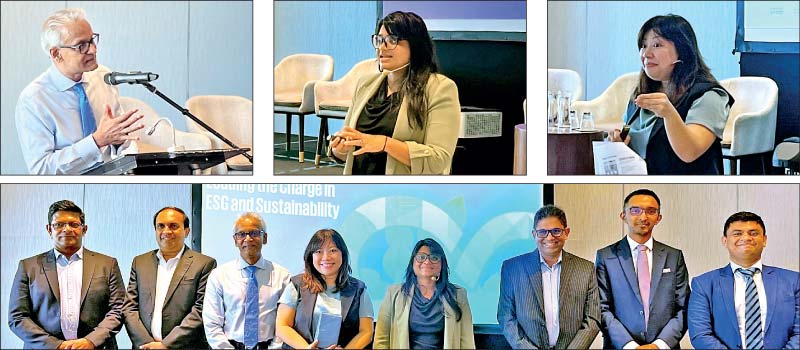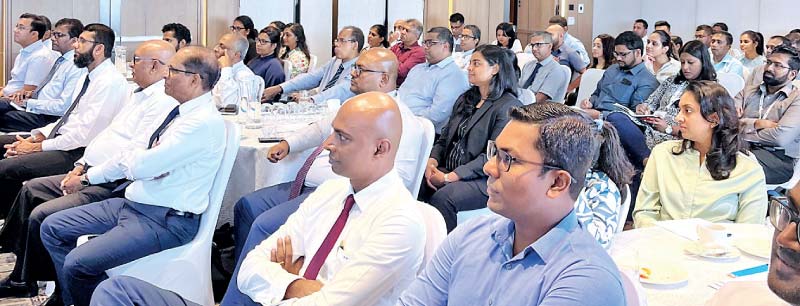Monday Feb 23, 2026
Monday Feb 23, 2026
Monday, 23 December 2024 00:00 - - {{hitsCtrl.values.hits}}


In a step towards fostering a sustainable business landscape, KPMG in Sri Lanka recently hosted an influential ESG (Environmental, Social, and Governance) forum, ‘Ahead of Curve’, underscoring the importance of integrated strategies for a sustainable future.
The event, led by KPMG in Sri Lanka’s ESG, Family Business & Board Governance, Global Assurance, Sustainability Partner Pyumi Sumanasekara, and KPMG ESG Singapore Partner Cherine Fok, gathered a diverse group of industry leaders and stakeholders committed to embedding ESG principles across industries.
Drawing from her extensive experience with ESG frameworks and IFRS Sustainability Disclosure Standards (IFRS S1 and IFRS S2), Pyumi Sumanasekara highlighted in her keynote the critical role of robust governance in facilitating business transformation, highlighting the necessity of integrating anticipated Environment/Climate Risk and Social Risks into risk registers, by focusing on future risks, and their interconnections. This aligns with findings from the KPMG CEO Survey, which revealed that 69% of CEOs have maintained their climate-related strategies over the past year, adapting the climate-related language and terminology, to better align with evolving stakeholder expectations. She also focused on the pace of changing global regulations and how the effects would impact the Sri Lankan export market which would require proactive compliance and clear governance frameworks to ensure that our local businesses stay relevant and resilient. Attention drew into Sri Lanka’s status as one of the world’s 36 biodiversity “Hotspots” which presents both a responsibility for businesses to exercise due care and an opportunity to attract sustainable financing. Her insights resonated with attendees who are already undergoing transformation and are eager to see Sri Lankan businesses shift from merely reporting on sustainability to driving strategic impact.
Complementing this, Fok shared insights into the unique ESG challenges faced by organisations across Asia. She shed light on Singapore’s evolving regulations and the pressing need for transparent sustainability reporting that goes beyond compliance to truly influence sustainable development. Her expertise in ESG issues across diverse markets provided an international perspective on how Sri Lanka can navigate emerging regulatory landscapes and business demands. The session highlighted the case of Gprint.ai, a platform launched by KPMG in collaboration with the Monetary Authority of Singapore (MAS), MUFG, HSBC, and Microsoft, which was designed to promote sustainability both locally and internationally by seamlessly gathering and transforming ESG data for automated disclosure solutions The discussion highlighted case studies on investor-led financing and the use of value chain analysis through strategic alliances to uncover insights that can help businesses redefine and transform their operations. The key takeaway was that ESG is not just the responsibility of one individual or department but requires a company-wide strategic shift. For those in the audience—whether leaders, managers, or team members—the message was clear: ESG is everyone’s responsibility.
The panel discussion that followed featured a distinguished group of leaders: UN Global Compact Network Sri Lanka Executive Director Rathika de Silva, United Nations Resident Coordinator’s Office in Sri Lanka Partnerships and Development Finance Specialist Azam Bakeer Markar, Colombo Stock Exchange Chief Executive Officer Rajeeva Bandaranaike, Standard Chartered Bank Sri Lanka Chief Executive Officer and Sri Lanka Banks Association Chairman Bingumal Thewarathanthri, and MAS Capital Ltd. Environmental Sustainability General Manager Dhanujie Jayapala (CEnv), who explored industry-specific challenges and shared strategies to overcome barriers in implementing effective ESG frameworks.
Industry leaders highlighted the growing importance of environmental, social, and governance (ESG) considerations in driving economic growth and attracting foreign investment.
Thewarathanthri, discussed how Sri Lanka’s financial institutions are adapting to ESG considerations, outlining how transparent, accountable governance models are crucial for attracting foreign investment. His commentary underscored that in today’s global market, investors demand transformation that go beyond as they seek sustainable practices that align with broader social and environmental goals. Rajeeva Bandaranaike also voiced a similar trend stating that the stock exchange is working towards introducing additional instruments, such as blue bonds and social bonds.
Markar, emphasised how Sri Lankan firms can approach ESG through resource efficiency, particularly within sectors like manufacturing and agriculture. His message was clear: “integrating ESG isn’t just beneficial for the planet but also an opportunity for businesses to gain competitive advantage and long-term viability.”
This was complemented by de Silva who mentioned the exponential impact of alliances and collaboration in creating more resilient economies, who spoke from his past experience in the construction industry and how the transformation approach to emissions, introduced the clinkering process in Sri Lanka resulting in efficiencies.
Jayapala, compounded the fact stating that a transformation mindset creates innovations and opens new opportunities for businesses.
A crucial takeaway from the event was the notion that sustainability is an ongoing journey. Speakers collectively stressed that companies must prioritise measurable, transparent ESG goals to establish credibility and drive meaningful change. Island nations like ours have genuine opportunities, and forging alliances will pave the way to a resilient future.
KPMG said its ESG forum successfully catalysed conversations that extend far beyond the corporate sphere, positioning sustainability as a necessary evolution for every Sri Lankan industry. By bringing together leaders, experts, and stakeholders, the forum emphasised a vital message: sustainability, collaboration, and economic success are not only compatible but essential for building a resilient future.